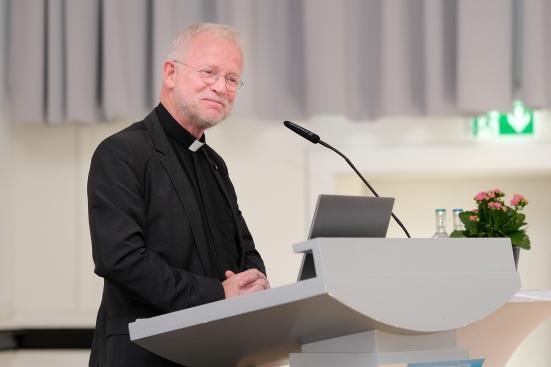People should do good

Prof. Dr. Peter Schallenberg spoke at the opening of the Wednesday Academy semester on the topic of "Virtues in democracy. On the political relevance of Christianity".
The winter semester of the Wednesday Academy has been ceremoniously opened. The guest speaker was the Catholic moral theologian Prof. Dr. Peter Schallenberg (Paderborn). His topic was "Virtues in democracy. The political relevance of Christianity". The topic is part of the semester program of the lecture series "Forum Siegen" on the subject of "Civil Society under Pressure".
Prof. Dr. Barbara Müller-Naendrup, Vice-Rector of the University, welcomed the guests. She emphasized the relevance of the formats and the variety of topics on offer under the umbrella of the University of Siegen's House of Science. According to the Vice-Rector, Christianity and democracy require commitment and depend on people taking responsibility.
Prof. Dr. Stephan Habscheid, academic director of the Wednesday Academy, introduced the speaker. Strictly speaking, the churches are not part of civil society, as they are corporations under public law. However, they take on welfare state tasks, for example organizing religious education in public schools. They receive taxes that are collected by the state. However, they are not integrated into the state administration, but are independent of it. Church clubs, associations and initiatives are active in civil society in a variety of ways.
Prof. Dr. Peter Schallenberg, born in 1963, holds the Chair of Moral Theology at the Paderborn Faculty of Theology. This is an independent, state university sponsored by the Archdiocese of Paderborn, which was founded in 1614. He first studied theology and philosophy in Paderborn, then at the Pontifical Gregorian University and at the Collegium Germanicum et Hungaricum, a training center for Catholic priests in Rome.
As part of his lecture, Peter Schallenberger invited the audience on a short journey through history. In his speech to commemorate the landing of the Allied troops in Normandy on June 6, 2004, the then Cardinal Ratzinger referred to Plato's "Gorgias" and the dialog between Socrates and Kallikes. For Callicles, the right of the strongest and the pursuit of pleasure are considered the highest good. Socrates, on the other hand, distinguishes between the good and the pleasant. He defines a good life as an orderly, just life: "It is better to suffer injustice than to do injustice." Death separates the body from the immortal soul. If the soul came before the judge, scars and wounds would become visible that arose because its inner beauty, its dignity, was disregarded. With regard to the Basic Law of the Federal Republic of Germany - according to Peter Schallenberger - the translation would be: "Human dignity is inviolable".
However, despite the clarity of this sentence, it can be challenging to translate it into concrete situations. The question arises as to where the protection of inviolable dignity justifies violent action. Peter Schallenberg used the example of the assassins of July 20, 1944, who, after much deliberation, decided to kill Hitler in order to end war, terror and misery.
St. Augustine is credited with saying: God's love for man means "I want you to be!". This undoubted necessity and meaningfulness of the existence of every human being today corresponds to the inviolable human dignity of the first article of the Basic Law. Referring to Cain's fratricide of Abel in the Old Testament, the state has the role of guarantor of minimal justice by means of laws and the punishment of violations. The concept of the state is based on the Augustinian term "status iustitiae" - the state of justice. For since Cain and Abel, people's hearts have had two options - to become masters of evil or to surrender to evil.
After the period of Nazi terror with unspeakable crimes against humanity and human dignity, the inviolability of human dignity was cemented in the Basic Law, which was drawn up on Herrenchiemsee between August 10 and 23, 1948. Article 1 of the Basic Law arose from the experience of human abysses. Perhaps, according to Schallenberg, such a good constitution could only have emerged from very dark years.
The speaker noted that society and democracy needed discussions based on the exchange of arguments. At the same time, Schallenberg emphasized with regard to peace ethics: "We are in the necessity of having to wage just wars." He continued: "Augustine had not reckoned with the madness of people." What remains is the postulate that people should do good. The concrete "filling" is a long way off and ultimately remains an ongoing task in negotiation.


